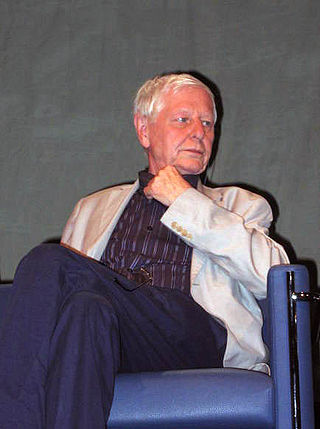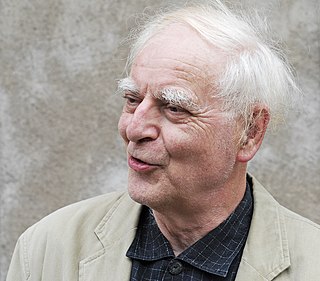Related Research Articles

Hans Magnus Enzensberger was a German author, poet, translator, and editor. He also wrote under the pseudonyms Andreas Thalmayr, Elisabeth Ambras, Linda Quilt and Giorgio Pellizzi. Enzensberger was regarded as one of the literary founding figures of the Federal Republic of Germany and wrote more than 70 books, with works translated into 40 languages. He was one of the leading authors in Group 47, and influenced the 1968 West German student movement. He was awarded the Georg Büchner Prize and the Pour le Mérite, among many others.

Robert Walser was a German-speaking Swiss writer. He additionally worked as a copyist, an inventor's assistant, a butler, and in various other low-paying trades. Despite marginal early success in his literary career, the popularity of his work gradually diminished over the second and third decades of the 20th century, making it increasingly difficult for him to support himself through writing. He eventually had a nervous breakdown and spent the remainder of his life in sanatoriums.

Christian Enzensberger was a German Professor of English studies, author and a translator of English literature into German.

Adolf Muschg is a Swiss writer and professor of literature. Muschg was a member of the Gruppe Olten.
Lutz Wingert is a German philosopher who is sometimes identified as one of the "Third Generation" of the Frankfurt School of philosophy. He is a professor of philosophy focusing on practical philosophy at the Swiss Federal Institute of Technology Zurich and a member of the Zentrum Geschichte des Wissens. He is a former student of, and a co-author with, Jürgen Habermas, a founding member of the Frankfurt School. Wingert is a former chair of practical philosophy at the University of Dortmund. Along with Wilfried Hinsch, he edits the Ideen & Argumente series.

Katharina Hacker is a German author best known for her award-winning novel Die Habenichtse. Hacker studied philosophy, history and Jewish studies at the University of Freiburg and the University of Jerusalem. Her studies in Israel have been seen as an attempt to compensate for the strong anti-Semitic feelings of her Silesian grandmother. She did not finish her studies with an academic degree. Since 1996, she has been living as a freelance writer in Berlin. In 2006, she was the second writer to be awarded the German Book Prize for Die Habenichtse. In this and other works, Hacker examines the consequences of globalization and neoliberalism on the working life, social relations, and family interactions of her German protagonists.

Friederike Mayröcker was an Austrian writer of poetry and prose, radio plays, children's books and dramatic texts. She experimented with language, and was regarded as an avantgarde poet, and as one of the leading authors in German. Her work, inspired by art, music, literature and everyday life, appeared as "novel and also dense text formations, often described as 'magical'." According to The New York Times, her work was "formally inventive, much of it exploiting the imaginative potential of language to capture the minutiae of daily life, the natural world, love and grief".

Michael Krüger is a German writer, publisher and translator.
Christa Reinig was a German poet, fiction and non-fiction writer, and dramatist. She began her career in the Soviet occupation zone which became East Berlin, was banned there, after publishing in West Germany, and moved to the West in 1964, settling in Munich. She was openly lesbian. Her works are marked by black humor, and irony.

Silke Scheuermann is a German poet and novelist. She was educated in Frankfurt, Leipzig, and Paris. She is best known for her debut novel Die Stunde zwischen Hund und Wolf, which has been translated into ten languages including English. She has won numerous German and European literary prizes and fellowships, including the Georg-Christoph-Lichtenberg-Preis, the Leonce-und-Lena-Preis, the Hölty Prize, the Bertolt-Brecht-Literaturpreis, and a Villa Massimo fellowship.

Iris Hanika is a German writer. She was born in Würzburg, grew up in Bad Königshofen and has lived in Berlin since 1979, where she studied Universal and Comparative Literature at the FU Berlin. She was a regular contributor to German periodicals like Frankfurter Allgemeine Zeitung and Merkur. Hanika won the LiteraTour Nord prize and the EU Prize for Literature for her novel Das Eigentliche. In 2020, she was awarded the Hermann-Hesse-Literaturpreis for her novel Echos Kammern. In 2021, she won the Leipzig Book Fair Prize. Hanika wrote previously mainly short non-fictional texts, later novels, including two books on psychoanalysis.

Sibylle Lewitscharoff was a German author. She first wrote in her spare time as a bookkeeper, quitting after her first novel, Pong, appeared in 1998, and was successful with critics and the public, earning her the Ingeborg Bachmann Prize. It was followed by Consummatus (2006), Apostoloff (2009) and Blumenberg (2011). She received several German literary awards, including the Georg Büchner Prize in 2013, for "[re-exploring] the boundaries of what we consider our daily reality with an inexhaustible energy of observation, narrative fantasy and linguistic inventiveness.".

Jürgen Becker is a German poet, prose writer and radio play author. He won the 2014 Georg Büchner Prize.

Sasha Marianna Salzmann is a German playwright, essayist, theatre curator and novelist. She is writer in residence at the Maxim Gorki Theatre in Berlin where she was artistic director of the studio theatre, Studio Я, from 2013 to 2015.

Luise F. Pusch is a German linguist. She is regarded as the co-founder of feminist linguistics in Germany, along with Senta Trömel-Plötz.

Peter Hamm was a German poet, author, journalist, editor, and literary critic. He wrote several documentaries, including ones about Ingeborg Bachmann and Peter Handke. He wrote for the German weekly newspapers Der Spiegel and Die Zeit, among others. From 1964 to 2002, Hamm worked as contributing editor for culture for the broadcaster Bayerischer Rundfunk. He was also a jury member of literary prizes, and critic for a regular literary club of the Swiss television company Schweizer Fernsehen.

Norbert Gstrein is an Austrian writer. He was born in Mils in Tyrol, the son of the hotelier and ski school director Norbert Gstrein (1931–1988) and Maria Gstrein, née Thurner. He grews up with his five siblings in Vent and attended the secondary school from 1971 to 1979 in Imst. From 1979 to 1984, Gstrein studied mathematics in Innsbruck, Stanford and Erlangen. He not completed his PhD in 1988 at the University of Innsbruck, under the supervision of Roman Liedl and Gerhard Frey.

Ilma Rakusa is a Swiss writer and translator. She translates French, Russian, Serbo-Croatian and Hungarian into German.

Robert Schindel is an Austrian lyricist, director and author.

Ulla Berkéwicz is a German actress, author and publisher. The name "Berkéwicz", which she adopted in 1968 as a stage name, and by which she has since become generally known, is derived from the family name used by her Jewish grandmother, "Berkowitz".
References
- 1 2 3 Böttcher, Kurt, et al., eds., Lexikon deutschsprachiger Schriftsteller 20. Jahrhundert. Hildesheim: Georg Olms Verlag, 1993, p. 476. ISBN 3-487-09611-0
- 1 2 Ravensburg, Munzinger-Archiv GmbH. "Gertrud Leutenegger – Munzinger Biographie". www.munzinger.de (in German). Retrieved 6 March 2017.
- 1 2 "Übersetzen als Kulturaustausch – Leutenegger, Gertrud – Biografie – Goethe-Institut". www.goethe.de (in German). Retrieved 6 March 2017.
- ↑ "Newsmeldung – Suhrkamp Insel". www.suhrkamp.de. Retrieved 6 March 2017.
- ↑ "Newsmeldung – Suhrkamp Insel". www.suhrkamp.de. Retrieved 6 March 2017.
- ↑ "Newsmeldung – Suhrkamp Insel". www.suhrkamp.de. Retrieved 6 March 2017.